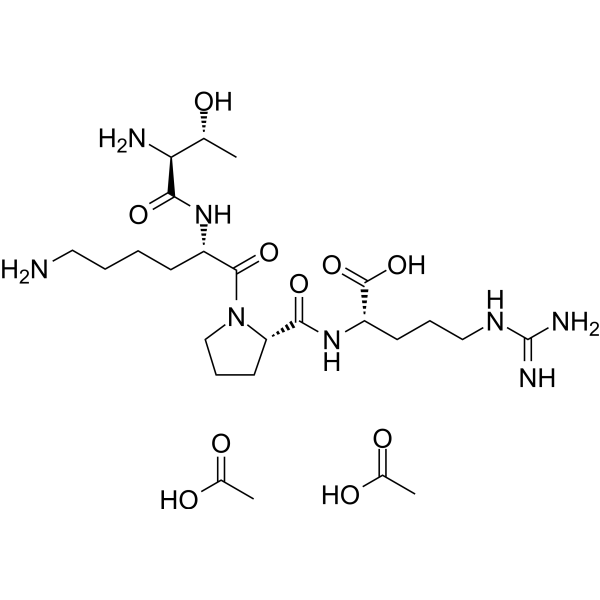
Tuftsin diacetate
CAS No. 72103-53-8
Tuftsin diacetate( —— )
Catalog No. M30544 CAS No. 72103-53-8
Tuftsin diacetate, a tetrapeptide, is a macrophage/microglial activator. Tuftsin is a tetrapeptide, Thr-Lys-Pro-Arg, which resides in the Fc-domain of the heavy chain of immunoglobulin G. Tuftsin possesses a broad spectrum of activities related primarily to the immune system function and exerts on phagocytic cells, notably on macrophages.
Purity : >98% (HPLC)
 COA
COA
 Datasheet
Datasheet
 HNMR
HNMR
 HPLC
HPLC
 MSDS
MSDS
 Handing Instructions
Handing Instructions
| Size | Price / USD | Stock | Quantity |
| 5MG | 713 | Get Quote |


|
| 10MG | 1215 | Get Quote |


|
| 25MG | 2471 | Get Quote |


|
| 100MG | Get Quote | Get Quote |


|
| 200MG | Get Quote | Get Quote |


|
| 500MG | Get Quote | Get Quote |


|
Biological Information
-
Product NameTuftsin diacetate
-
NoteResearch use only, not for human use.
-
Brief DescriptionTuftsin diacetate, a tetrapeptide, is a macrophage/microglial activator. Tuftsin is a tetrapeptide, Thr-Lys-Pro-Arg, which resides in the Fc-domain of the heavy chain of immunoglobulin G. Tuftsin possesses a broad spectrum of activities related primarily to the immune system function and exerts on phagocytic cells, notably on macrophages.
-
DescriptionTuftsin diacetate, a tetrapeptide, is a macrophage/microglial activator. Tuftsin is a tetrapeptide, Thr-Lys-Pro-Arg, which resides in the Fc-domain of the heavy chain of immunoglobulin G. Tuftsin possesses a broad spectrum of activities related primarily to the immune system function and exerts on phagocytic cells, notably on macrophages.(In Vitro):Tuftsin is a tetrapeptide, Thr-Lys-Pro-Arg, which resides in the Fc-domain of the heavy chain of immunoglobulin G. Tuftsin possesses a broad spectrum of activities related primarily to the immune system function and exerts on phagocytic cells, notably on macrophages. Tuftsin's capacity to augment cellular activation is mediated by specific receptors that are identified, characterized, and recently isolated from rabbit peritoneal granulocytes. Tuftsin, a macrophage/microglial activator, dramatically improves the clinical course of experimental autoimmune encephalomyelitis (EAE), a well-established animal model for MS. Tuftsin administration correlates with upregulation of the immunosuppressive Helper-2 Tcell (Th2) cytokine transcription factor GATA-3. Tuftsin promotes phagocytic activity for cells of monocytic origin, such as neutrophils, macrophages and microglia, all of which are thought to express Tuftsin receptors.
-
In VitroTuftsin is a tetrapeptide, Thr-Lys-Pro-Arg, which resides in the Fc-domain of the heavy chain of immunoglobulin G. Tuftsin possesses a broad spectrum of activities related primarily to the immune system function and exerts on phagocytic cells, notably on macrophages. Tuftsin's capacity to augment cellular activation is mediated by specific receptors that are identified, characterized, and recently isolated from rabbit peritoneal granulocytes. Tuftsin, a macrophage/microglial activator, dramatically improves the clinical course of experimental autoimmune encephalomyelitis (EAE), a well-established animal model for MS. Tuftsin administration correlates with upregulation of the immunosuppressive Helper-2 Tcell (Th2) cytokine transcription factor GATA-3. Tuftsin promotes phagocytic activity for cells of monocytic origin, such as neutrophils, macrophages and microglia, all of which are thought to express Tuftsin receptors.
-
In Vivo——
-
Synonyms——
-
PathwayProteasome/Ubiquitin
-
TargetEndogenous Metabolite
-
Recptor——
-
Research Area——
-
Indication——
Chemical Information
-
CAS Number72103-53-8
-
Formula Weight620.7
-
Molecular FormulaC25H48N8O10
-
Purity>98% (HPLC)
-
Solubility——
-
SMILES——
-
Chemical NameSequence:Thr-Lys-Pro-Arg
Shipping & Storage Information
-
Storage(-20℃)
-
ShippingWith Ice Pack
-
Stability≥ 2 years
Reference



-
1-Hydroxypyrene
1-Hydroxypyrene, a biomarker of exposure to polycyclic aromatic hydrocarbons, is analyzed in urine samples.
-
3-Hydroxyanthranilic...
3-Hydroxyanthranilic acid also known as 2-amino-3-hydroxy-benzoate or 3-ohaa belongs to the class of organic compounds known as hydroxybenzoic acid derivatives. 3-Hydroxyanthranilic acid has been found in human epidermis and bladder tissues and has also been detected in multiple biofluids such as urine and blood.
-
Spermidine
Spermidine inhibits NOS1 (nNOS). Spermidine binds and precipitates DNA and may be used for purification of DNA binding proteins. Spermidine activates PNK (polynucleotide kinase T4). Spermidine binds to and activates NMDA and has been shown to potentiate NMDA-induced currents in a concentration-dependent manner.



 Cart
Cart
 sales@molnova.com
sales@molnova.com


